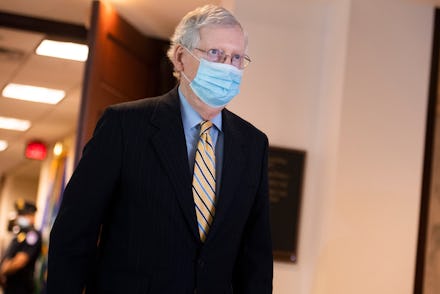The Senate may finally pass a new coronavirus relief bill

The coronavirus pandemic shows no signs of letting up anytime soon. In fact, the United States just set a new single-day case record bringing the country up to over three million recorded cases. As the pandemic surges, many Americans are desperate for relief. Now, the Senate may pass another coronavirus relief bill — but stimulus checks will likely have a stricter income cap than before.
Congress passed the $2 trillion CARES Act that included the original stimulus checks at the end of March. At the time, many pointed out that the $1,200 stimulus was nice but far from enough. In April, a survey found that one in three Americans said their share of the stimulus wouldn't sustain them for a month, and 84 percent said they wanted another wave of stimulus checks.
In May, the House of Representatives passed the HEROES Act, a second coronavirus relief bill that would do just that. Since then, the Republican-controlled Senate has been sitting on the act. For the first time, Senate Majority Leader Mitch McConnell finally suggested that not only would the Senate move ahead with the act but stimulus checks would remain apart of it.
However, there may be a lower income cap. When asked about a second wave of checks, Fortune reported that McConnell told reporters, "I think the people who have been hit the hardest are people who make about $40,000 a year or less. Many of them work in the hospitality industry...so that could well be a part of it."
For context, people earning above $99,000 per year couldn't receive an income check the first time around. The stimulus amount also decreased for individuals making over $75,000. If put into the bill, Fortune reported that McConnell's proposal of a $40,000 cap could exclude about half of American workers or households.
McConnell's remarks come after Democrats started increasing pressure for the Senate to start moving on the Heroes Act. Yesterday, House Speaker Nancy Pelosi tweeted, "Every day Leader McConnell & the Republican Senate continue their blockade of the House-passed #HeroesAct is a day they are failing the American people. The United States is in the middle of a crisis. Congress has a duty to protect lives & livelihoods from the coronavirus."
McConnell picking $40,000 as an income cap may seem random but it's not. In May, Federal Reserve Chairman Jerome Powell delivered a speech urging Congress to pass more coronavirus aid to avoid calamity. In his speech, Powell said that a Fed survey found, "Among people who were working in February, almost 40% of those in households making less than $40,000 a year had lost a job in March."
"Additional fiscal support could be costly, but worth it if it helps avoid long-term economic damage and leaves us with a stronger recovery. This tradeoff is one for our elected representatives, who wield powers of taxation and spending," Powell continued in his remarks.
As the Senate sits on the Heroes Act, stimulus checks aren't the only thing being held up. With rent and eviction moratoriums lifting, millions of people are facing eviction, with Black communities likely to be the hardest hit. Democrats included provisions related to evictions and foreclosures in the Heroes Act.
At the end of June, the House pulled out those provisions and passed a new $175 billion housing relief package. The bill's sponsor Rep. Maxine Waters (D-Calif.), who chairs the House Financial Services Committee, said, "We have been waiting on the Senate to take up the HEROES Act. They are not taking it up, they don't seem to care, they don't seem to understand that there are people out there who are going to be evicted, and so we have pulled it out of the HEROES Act and we are taking it up independently."
No matter what, a new coronavirus relief bill will be costly and that's part of why Republicans are reluctant to pass anything. But it's a slap in the face to poor Americans that while the Senate debates if they're worthy of helping, billionaires got $434 billion dollars richer during the pandemic.
People need food. People need housing. At the end of the day, there will be long-term consequences if the government does not step forward to adequately assist. And given the coronavirus pandemic's racial inequities, communities of color will suffer more than most.